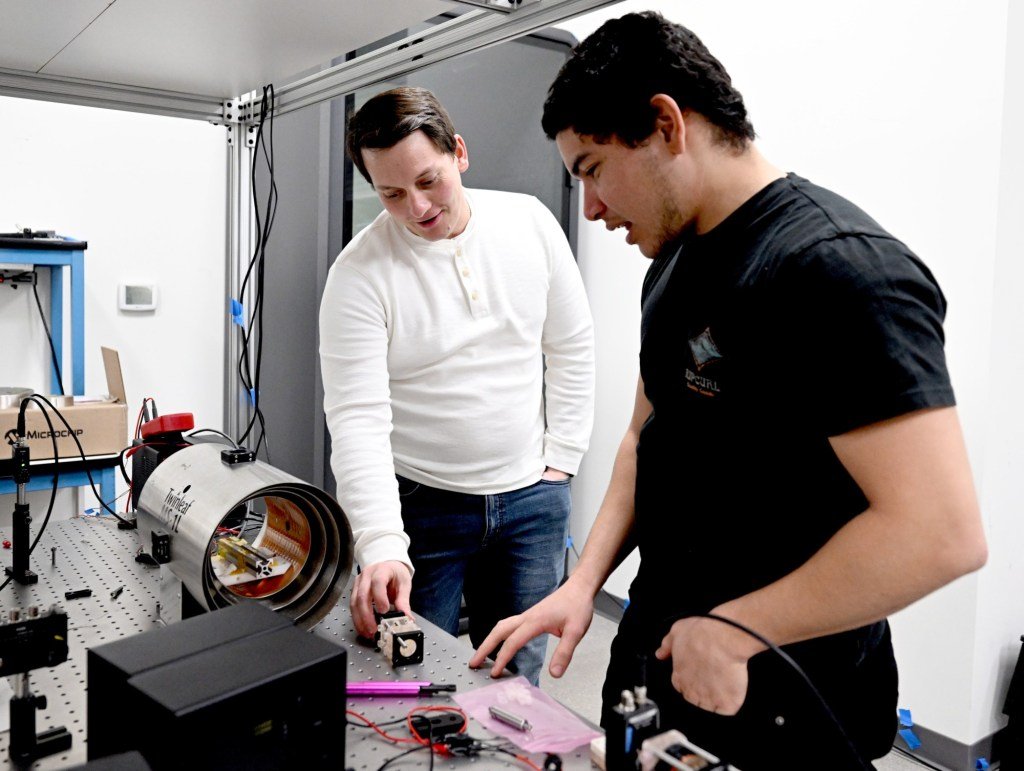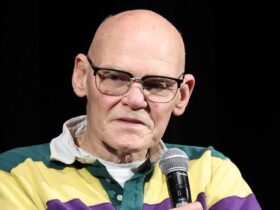Camila Uzcategui likes to say her startup company is working on creating a real-life Star Trek replicator.
In the movies, the replicator is a technology that looks like a microwave and can create any object.
“If you’re a Star Trek fan, it is this machine that creates objects out of thin air,” Uzcategui said. “Ours is based on science, of course, and so what we do is we have developed a completely new manufacturing technology … where we use light to shine on a liquid, and where that light shines it turns into a solid.”
Uzcategui is the CEO and co-founder of her startup company Vitro3D. Her company has created a new manufacturing technology similar to 3D printing but faster and more flexible.
She and her team are in the early stages of creating dental aligners, which look similar to a plastic retainer and are an alternative to braces. Further down the line, they hope to develop tissue engineering scaffolds that would go into the human body permanently for cartilage regeneration to prevent or treat arthritis. The company also values developing low-cost, sustainable materials so the technology can be used even in rural parts of the world while being good for the environment.
Uzcategui completed her doctorate at the University of Colorado Boulder and Vitro3D is a startup that spun out of the university. A startup is a new company created to bring a novel idea or technology to the market to create a sustainable business model.
Last year, CU Boulder launched a record 35 startup companies. Bryn Rees, associate vice chancellor for innovation and partnerships, said it’s part of the university’s mission.
“We want to make sure that really cutting-edge research has a broader impact and brings new innovations to people’s lives,” he said.
Venture Partners at CU Boulder has professionals who work with university innovators to help them move their technology from lab-scale discoveries into a new business or partnership with an existing business. It offers various resources, including entrepreneurial mentorship, training and funding support.
“These folks are world leaders in their scientific and their engineering disciplines, but sometimes the world of entrepreneurship and business is new to them,” Rees said. “So we want to make sure they have the educational resources and the support to make that larger impact.”
Former CU Boulder doctoral student Sristy Agrawal is now the CEO and co-founder of Mesa Quantum, a startup developing advanced chip-scale quantum devices for next-generation position, navigation and timing capabilities.
People rely heavily on GPS for navigation, internet and communications, Agrawal said, but what people don’t realize is how easily it can fall apart. She recalled first learning about the problem when a truck driver used a GPS blocker to try and evade his boss. He drove near an airport while using it and the device blocked air traffic control communications, grounding flights for hours.
“We realize how wonderful (GPS) is,” Agrawal said. “But what we don’t realize is GPS is not just for navigation. That same timing signal is used to synchronize our entire virtual infrastructure.”
Agrawal said it’s become a major national security problem.
“GPS resilience is one of the biggest concerns for every single government across the world right now,” she said. “You take down the timing and the GPS from a country and you can tumble its infrastructure.”
Agrawal said there is an open call from the government to buy a million of these devices if they can be produced. So, she’s working with her team on doing just that by creating chip-scale atomic clocks, devices that are so small they can be directly integrated into existing hardware so if anything happens to GPS, it can still be resilient.
Now, Mesa Quantum is looking to commercialize. She said she’s grateful the university took her seriously and provided so much support.
“Another reason a company like this was possible is because when a grad student goes to Venture Partners — at other universities, I don’t know what that interaction is like — but here, the belief they have in you and the way they make you feel, it really makes a difference,” she said.
Rees said any potential startup must be aiming to solve a real-world problem. Venture Partners has training for scientists and engineers to understand the perspective of the user or customer and identify their problems.
He said startups have emerged as the most successful way to bridge the gap between early-stage research to a commercial product. It’s very high risk and needs time and money to develop. Often an established corporate partner can help commercialize it but often wants the product at the advanced stage where it has customer interest and revenue.
“But there’s years and years sometimes to get to that point, and a startup company is a great vehicle to do that,” Rees said.
CU Boulder’s commercialization, including startup companies, had an economic impact of $8 billion nationally and $5.2 billion in Colorado from 2018-2022, according to a 2022 report from CU Boulder’s Leeds School of Business. Ball Aerospace was one of the first startup companies out of CU Boulder. Another is Solid Power, which creates electric vehicle batteries and other components and has partnered with Ford and BMW.
“The business community, and in particular what we call the deep tech business community of Colorado, has the university’s fingerprints all over it,” Rees said.
It can take anywhere from two to 15 years or more for a startup to commercialize, Rees said. It depends on how new and disruptive the technology is, how much capital is needed and the amount of regulations around it.
“It’s a long game, but it’s really rewarding to see something that can be so transformative,” Rees said. “If we can treat or cure a disease we never could before or make a medicine accessible to populations that couldn’t have access to it before, it’s worth 15 years.”
Uzcategui hires talent from Boulder, the university and the Denver metro area. She said the startup ecosystem in Boulder created in large part by the university and Venture Partners helped her company get to where they are today.
“We are increasing the visibility of the startup ecosystem in the area,” she said. “I think when people think of startup ecosystems they think of Silicon Valley, they think of Boston, sometimes New York … but I think there’s something really beautiful happening in the Boulder and in the Mountain West area that shows there’s innovation and entrepreneurship flourishing in this area as well.”
Get more business news by signing up for our Economy Now newsletter.













Leave a Reply